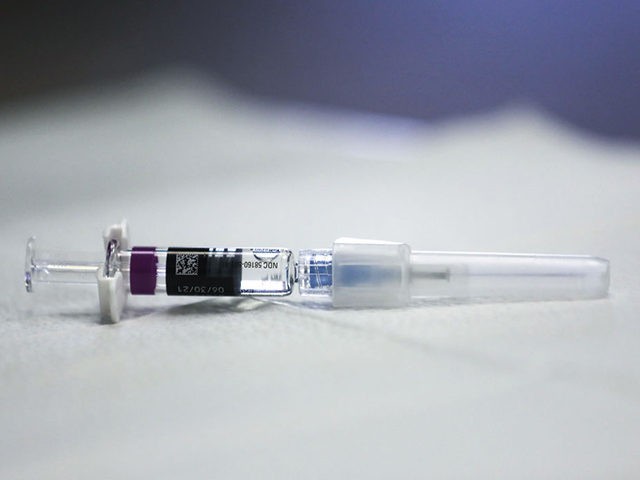The Brazilian Health Regulatory Agency (Anvisa), which approves pharmaceutical drugs for use, accused the government of China on Monday of being “not transparent” in its development of its primary Chinese coronavirus vaccine candidate.
The Communist Party is promoting “CoronaVac,” a vaccine candidate by the Chinese company Sinovac, as an alternative to international vaccine candidates. It is competing with an American vaccine by the company Pfizer, which recently received approval from the U.S. Food and Drug Administration (FDA), and with a competitor by Moderna expected to soon receive approval. Anvisa, the FDA analog in Brazil, has allowed Sinovac to conduct trials in Brazil that are currently in Phase Three, the last before approval.
Anvisa condemned the Chinese company for not providing enough information for Brazil to safely approve the vaccine candidate in its position as “the international leader in the CoronaVac evaluation process.”
Anvisa’s statement regarding potential emergency approval of the vaccine follows a highly public dispute between President Jair Bolsonaro and the governor of Sao Paulo state, Joao Doria, who attempted to purchase a high number of CoronaVac doses without presidential approval. Bolsonaro, who has repeatedly opposed importing the Chinese vaccine candidate and using it widely in Brazil, halted the import of the Chinese product after his health minister had approved Doria’s move.
“The Brazilian people will not be anyone’s guinea pig,” Bolsonaro affirmed in a social media statement confirming that he had canceled the order.
Bolsonaro has also mocked the governor for his support of the vaccine candidate, calling it “Joao Doria’s Chinese vaccine.”
The Brazilian newspaper O Globo, in reporting on Anvisa’s statement, noted that Doria is widely expected to pressure Anvisa behind the scenes to issue an emergency approval for CoronaVac.
“This vaccine has already received emergency use authorization in China since June of this year. The Chinese criteria to issue authorization for emergency use in China are not transparent and there is no information available over the criteria currently used by Chinese agencies to make this decision,” Anvisa detailed.
The statement further noted that only China has approved the Sinovac product, so no other list of criteria for approving the product exists. Without this information, the agency concluded, approving the vaccine would be “exposing the Brazilian population to risks that will not be monitored by the company that developed the vaccine.”
Anvisa made a note to emphasize that its hesitation in issuing an emergency approval would not have an impact on the normal timeline for approving such a drug and that it was not the product of “geopolitical issues.”
Hours after issuing the initial statement, Anvisas published an addendum clarifying: “when we said that ‘the Chinese criteria to issue authorization for emergency use in China are not transparent,’ we meant to say that they are not public and not available at that country’s agency’s website.”
The Butantan Institute, a Brazilian organization that is working with Sinovac on the CoronaVac, announced Monday that it would no longer seek emergency use authorization but rather the conventional means of approval.
Bolsonaro’s government has publicly announced plans to import several vaccine candidates developed outside of China. According to Agence France-Presse (AFP), Brazil is planning to import at least 70 million doses of the approved Pfizer vaccine from the United States and 300 million of a vaccine candidate developed by AstraZeneca and the University of Oxford.
Despite attempts by Doria to import the Chinese vaccine candidate, resistance to any vaccine from China has grown in Sao Paulo. In November, hundreds of people took the streets of the city to preemptively protest any regulations to mandate Chinese-made vaccine candidates and to reject products made in China. Doria had previously suggested the potential of making the Chinese product mandatory.
Bolsonaro has vocally opposed mandating the taking of any vaccine for the Chinese coronavirus and has said he would personally not take the vaccine, as he has already overcome a Chinese coronavirus infection. Some medical experts — most prominently American infectious disease expert Dr. Anthony Fauci, have suggested that those who have had the virus should take the vaccine to expand antibody resistance. Studies have no definitive answer yet as to how long antibodies created by an infection protect a person from a second bout with the virus.
China has a long and troubled history of harmful incidents caused by its vaccine companies. In November, the city of Lanzhou reported that it had documented over 6,000 cases of a bacterial infection in the past year caused by a vaccine factory leaking the pathogen, causing brucellosis. The factory, the Lanzhou Biopharmaceutical Plant, used expired sanitizers to clean work stations, allowing the bacteria to thrive.
Another Chinese company, Chengsheng Bio-Tech, reportedly used expired vaccines on nearly 1 million Chinese children, effectively rendering them immunocompromised, beginning in 2018. The incident resulted in widespread parent protests, including some in which parents violently beat public officials for allowing their children to be endangered by largely controlled infectious diseases such as Polio and Diptheria.

COMMENTS
Please let us know if you're having issues with commenting.